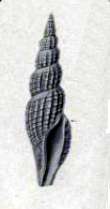Miraclathurella gracilis
Miraclathurella gracilis is an extinct species of sea snail, a marine gastropod mollusk in the family Pseudomelatomidae, the turrids and allies.[1]
| Miraclathurella gracilis | |
|---|---|
 | |
| Shell of † Miraclathurella gracilis | |
| Scientific classification | |
| Kingdom: | Animalia |
| Phylum: | Mollusca |
| Class: | Gastropoda |
| Clade: | Caenogastropoda |
| Clade: | Hypsogastropoda |
| Clade: | Neogastropoda |
| Superfamily: | Conoidea |
| Family: | Pseudomelatomidae |
| Genus: | Miraclathurella |
| Species: | M. gracilis |
| Binomial name | |
| Miraclathurella gracilis (Gabb, 1866) | |
| Synonyms | |
| |
Description
The length of the shell attains 28.5 mm, its diameter 7.5 mm.
On the penult whorl there are sixteen axial ribs, crossed by five or six narrow spiral cords. On the body whorl there are about eighteen narrow, spiral cords, which are slightly enlarged where they cross the ribs and widely spaced in the peripheral region and above. Between them are many minute spirals and rather sharp axial striae.[2]
Distribution
Fossils of this marine species were found in Tertiary strata of Santo Domingo.
gollark: Photons don't have mass and thus do not contain bees.
gollark: Bees are quite heavy sometimes.
gollark: Particles actually gain mass through extremely small sub-femtoscale bees.
gollark: This is basically just word association games.
gollark: They actually build models, look at how it could work, see how it interacts with things, and if possible find ways to test it against what actually happens.
References
- Gabb, William M. "Cretaceous and Tertiary fossils." (1869): 1-299.
- B. Landau and C. Marques da Silva. 2010. Early Pliocene gastropods of Cubagua, Venezuela: Taxonomy, palaeobiogeography and ecostratigraphy. Palaeontos 19:1-221
External links
This article is issued from Wikipedia. The text is licensed under Creative Commons - Attribution - Sharealike. Additional terms may apply for the media files.